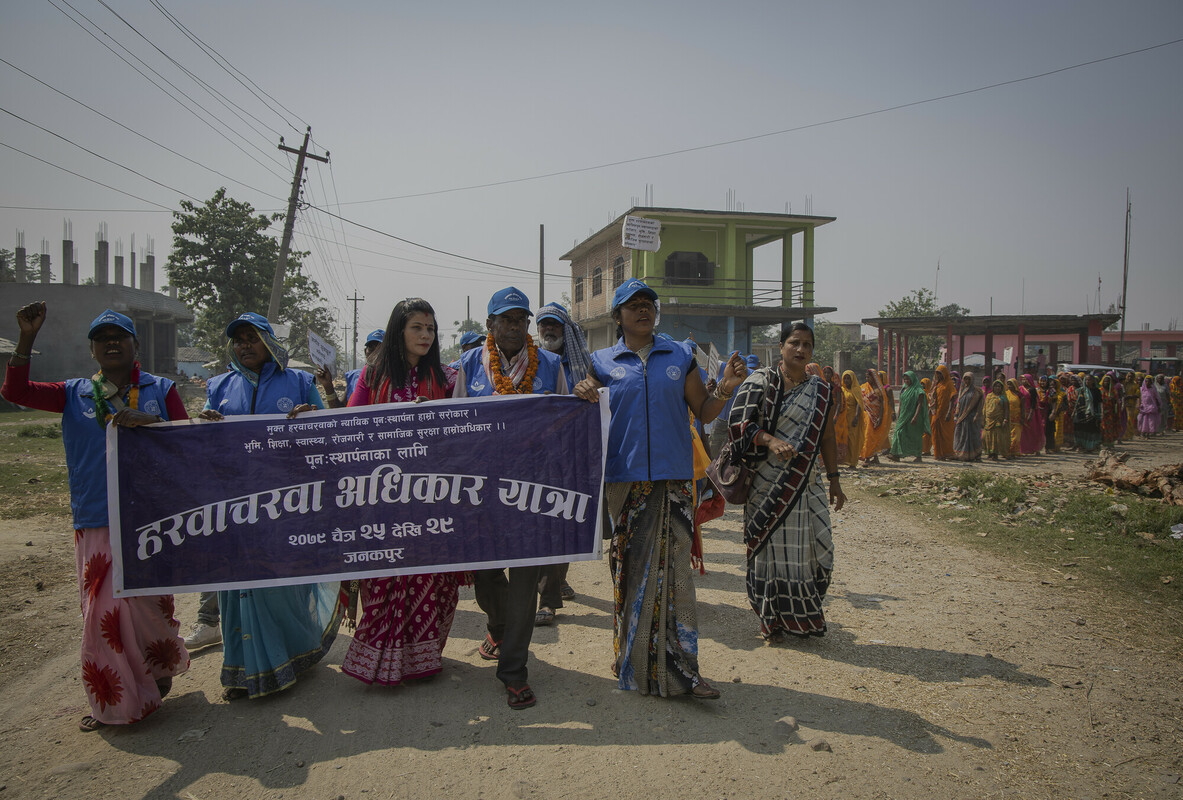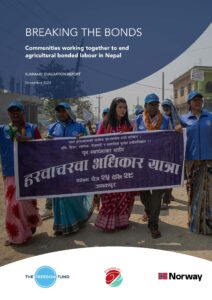Agricultural bonded labour in Nepal remains a critical issue rooted in longstanding social inequalities, poverty, and lack of access to economic opportunities. The Haliya, Harawa-Charawa, and Kamaiya systems of bonded labour, though officially abolished, continue to impact these communities, who are historically marginalised and face persistent barriers to realise their full range of rights. In 2014, the Freedom Fund initiated a program in Nepal to address critical issues facing the Harawa-Charawa community, with more than 120,000 adults and children estimated to be in forced labour. The program was later expanded to include the Haliya and Kamaiya communities.
This report summarises an evaluation of the Freedom Fund’s Nepal program funded by the Norwegian Agency for Development Cooperation (Norad) from 2021 to 2024. The evaluation was commissioned by the Freedom Fund to Progress Inc., which utilised a mixed-methods approach across five districts to examine the program’s impact in reducing agricultural bonded labour. Over 370 individuals were consulted, including survivors of bonded labour and members of affected communities, as well as local and national government officials.
Key insights from the evaluation
- Outcome One: A united movement of agricultural bonded labour groups is formed and active at the national level.
Outcome One of the program led to key success in uniting bonded labour groups (Haliya, Harawa-Charawa, and Kamaiya) into a Joint Struggle Committee (JSC), leading coordinated national and local level advocacy efforts. This unified approach helped in addressing specific needs of these communities, resulting in policy milestones, such as the establishment district-level Harawa-Charawa committees in all eight districts of Province 2. The JSC developed a Joint Strategic Plan (2022/23-2025/26) which guides the committee’s actions and ensures a balanced focus on issues pertinent to all three groups. - Outcome Two: The government changes policies to address agricultural bonded labour and provide support services for survivors.
Outcome Two of the program led to significant policy shifts and enhanced support services for agricultural bonded labourers through focused advocacy efforts. Key achievements included the program’s role in the Government of Nepal’s declaration of liberation for the Harawa-Charawa in 2022, incorporation of bonded labour issues into national policies, and the endorsement by key government stakeholders of action plans to support former bonded labourers. - Outcome Three: Agricultural bonded labourers have greater resilience as a result of accessing government and NGO support services.
Outcome Three of the program strengthened the resilience of agricultural bonded labourers by improving their access to essential services, socio-economic opportunities, and community support. Key accomplishments included facilitating access to citizenship and other necessary documentation to qualify for government services, advocating successfully for fair wage determinations, and formally registering community groups established under the program, thereby enabling them to access government resources.
Recommendations
The findings from this evaluation emphasises on continued government and civil society organisations (CSOs) support for the former bonded labour groups to reinforce these advances, including more robust funding, skill development programs, and sustainable livelihood options. Additionally, advocacy remains essential, with the JSC positioned to lead ongoing calls for policy implementation and broader systemic change.
- The JSC, supported by CSOs, to lead unified national advocacy efforts to integrate bonded labour issues into policy frameworks and political agendas, including dedicated budget allocations to fund rehabilitation programs, at the provincial and local levels.
- Larger CSOs, such as the Freedom Fund, to explore innovative funding models to support JSC initiatives and other networks, including seed funding for community driven projects and capacity building on grant management for bonded labour networks.
- CSOs to work with the Government of Nepal and bonded labour movements to provide former bonded labourers with sustainable, gender-responsive livelihood options, emphasising on market aligned and climate sensitive practices.
- CSOs to continue supporting sustained educational access for children from bonded labourer communities, advocating for subsidies and quotas to encourage school retention and reduce their risk of entering hazardous child labour.
The Freedom Fund Nepal program has been highly effective in addressing the complex challenges of bonded labour in Nepal, overcoming barriers like poverty, bureaucratic inefficiencies, and limited resources. By leveraging existing networks, it achieved substantial outcomes in advocacy, and rehabilitation, despite initial resistance from administrative levels. Through community mobilisation, it raised awareness, influenced policies, and catalysed systemic changes, resulting in a unified movement for bonded labourer rights. To sustain these gains, ongoing advocacy, CSO support, and government collaboration are essential to ensure policy implementation and funding for rehabilitation. The Freedom Fund’s Nepal program exemplifies the transformative potential of community-led collective action to address social injustice and challenge deep-rooted power inequalities for lasting impact.
Access the full report: Breaking the Bonds: Communities working together to end agricultural bonded labour in Nepal.
Photo credit: Filmatory Nepal/The Freedom Fund




